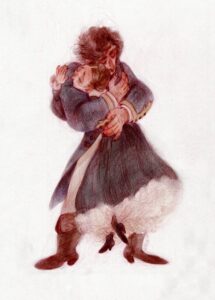Rochester is the wild man of Jane Eyre, the man of wild nature, a man of wealth who knows how to conduct himself with upper class figures like the odious Ingrams. He is the man of the moors, of storms, wind, full moons, enormous horses and dogs; a dark man full of passion, a trickster, the inhabitant of a lonely mansion where he keeps a woman imprisoned; a weird man who disguises himself as a gypsy woman. He is a reformed libertine, a traveler, one who survived the fevers of the West Indies. At the end, he is a broken man – blind and scarred, in despair … until Jane rescues him for the second time with her firm, unyielding love.
Rochester is used to command. He bears “a considerable breadth of chest … a dark face … a heavy brow … a heavy hand.” Yet he is also tormented. “I am a commonplace sinner” he tells us. “Since happiness is irrevocably denied me, I have a right to get pleasure out of life: and I will get it, cost what it may.” The burden he carries, his secret, leads him to both self-pity and to a certain ferocity of manner.
He wants to be a good man. He has it in him to be so. He sees to Mason’s injuries after being attacked by Bertha, his captive, mad wife. He rescues the staff at Thornfield after Bertha sets it on fire. He tries to rescue Bertha, his secret, his torment. He rejects the Ingrams in favor of Jane. Unlike St. John, he is capable of real affection and love. Bertha, however, is damning of him and problematic for Bronte herself.
Jane Eyre was published in 1847, 9 years after slavery was abolished in the West Indies. The mark of an abiding bigotry is embedded in Bertha’s character. Bertha is of mixed heritage, both black and white, a “creole”. She is presented as “large,” mad as a result of family inheritance or ‘bad breeding’ in the phrase of the class system. She is possessed of a “goblin-like laugh,” a “demonic laugh.” She makes “snarling, canine noise[s]”, and attacks others with teeth, knives and fire. She is less than human, possessor of “a discolored face” … “a savage face” … “blackened” … “dark.” She reminds Jane of a vampire.
She is kept locked in a room, a danger to all (except Grace Poole for reasons never explained), the terrible secret of Thornfield and damning of Rochester’s character.
How is one to read that now? And how is one to understand Rochester’s character after he lies to Jane about her real connection to him and tries to marry Jane in a marriage ceremony that would have been heinous in its falsity? Rochester is a ‘fallen’ man, close to choosing to become a beast.
Jane redeems Rochester. Jane is able to save him because of her strength of character. She knows that “women feel just as much as men feel.” She will not be intimidated and is incapable of simpering. She possesses a gravity of manner and acknowledges that “restlessness [is] in her nature.” She will seek escape before she accepts disrespect. She will make herself of use, but she will not be used.
She has earned Rochester because she has made herself free to choose him. She emerges from a year of silence and pursues him and chooses him, and a home and children and does so without compromising her deepest nature, that of the temperament of a modern woman, a 19th century avatar of 21st century independence and moral courage.
Still, the person of Bertha hangs over the end of the book. Bronte uses her as an element of the Gothic novel — the mystery in the attic, the secret of a lonely place and a brooding man, the direst threat to the hero and heroine. A curse not a person. In their final happiness she is forgotten.
But what I what to know is how she spent her days — counting the rooks, plotting her vengeance? How was Rochester with her as contrasted with how he is with Jane? And finally, this question: If Jane became melancholic or suffered from seizures or grew fractious, how would Rochester respond? Dear reader, would you trust him?
